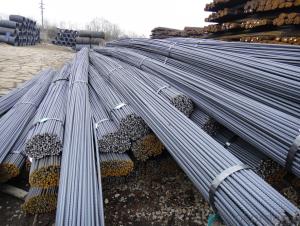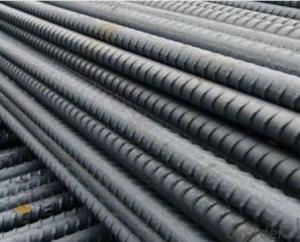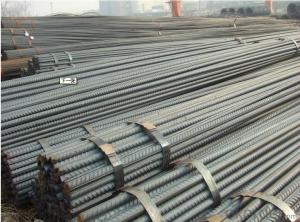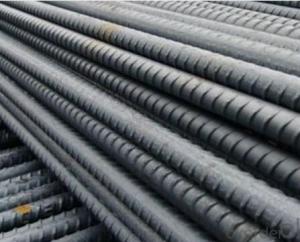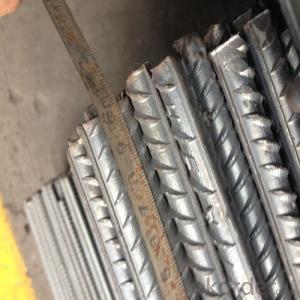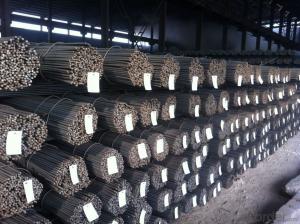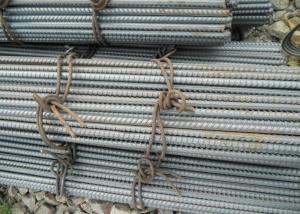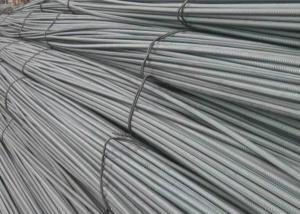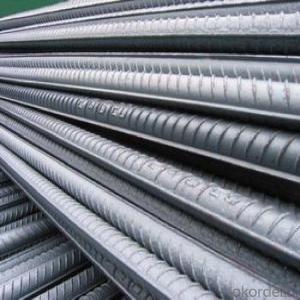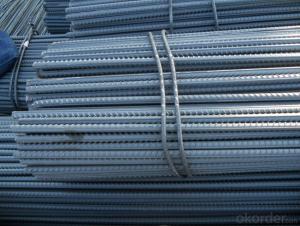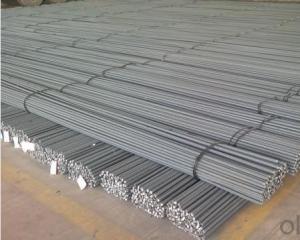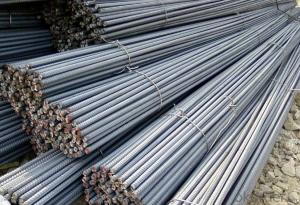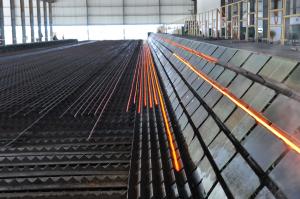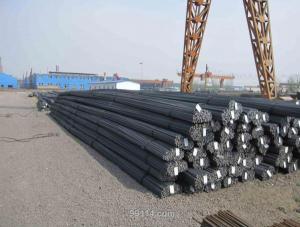High Quality Steel Deformed Bar HRB400 12/14/16mm
- Loading Port:
- Tianjin
- Payment Terms:
- TT or LC
- Min Order Qty:
- 50 m.t
- Supply Capability:
- 10000 m.t/month
OKorder Service Pledge
OKorder Financial Service
You Might Also Like
High Quality Steel Deformed Bar HRB400 12/14/16mm
Product Description:
Specifications of High Quality Steel Deformed Bar HRB400 12/14/16mm:
Standard | GB | HRB400 | |
Diameter | 12mm,14mm,16mm | ||
Length | 6M, 9M,12M or as required | ||
Place of origin | Hebei, China mainland | ||
Advantages | exact size, regular package, chemical and mechanical properties are stable. | ||
Type | Hot rolled deformed steel bar | ||
Chemical Composition of High Quality Steel Deformed Bar HRB400 12/14/16mm: (Please kindly find our chemistry of our material based on HRB400 as below for your information)
Grade | Technical data of the original chemical composition (%) | ||||||
C | Mn | Si | S | P | V | ||
HRB400 | ≤0.25 | ≤1.60 | ≤0.80 | ≤0.045 | ≤0.045 | 0.04-0.12 | |
Physical capability | |||||||
Yield Strength (N/cm²) | Tensile Strength (N/cm²) | Elongation (%) | |||||
≥400 | ≥570 | ≥14 | |||||
Theoretical weight and section area of High Quality Steel Deformed Bar HRB400 12/14/16mm as below for your information:
Diameter(mm) | Section area (mm²) | Mass(kg/m) | Weight of 12m bar(kg) |
12 | 113.1 | 0.888 | 10.656 |
14 | 153.9 | 1.21 | 14.52 |
16 | 201.1 | 1.58 | 18.96 |
Usage and Applications of High Quality Steel Deformed Bar HRB400 12/14/16mm:
Deformed bar is widely used in buildings, bridges, roads and other engineering construction. Big to highways, railways, bridges, culverts, tunnels, public facilities such as flood control, dam, small to housing construction, beam, column, wall and the foundation of the plate, deformed bar is an integral structure material. With the development of world economy and the vigorous development of infrastructure construction, real estate, the demand for deformed bar will be larger and larger.
Packaging & Delivery of High Quality Steel Deformed Bar HRB400 12/14/16mm:
Packaging Detail: products are packed in bundle and then shipped by container or bulk vessel, deformed bar is usually naked strapping delivery, when storing, please pay attention to moisture proof. The performance of rust will produce adverse effect.
Each bundle weight: 2-3MT, or as required
Payment term: TT or L/C
Delivery Detail: within 45 days after received advanced payment or LC.
Label: to be specified by customer, generally, each bundle has 1-2 labels
Trade terms: FOB, CFR, CIF
FAQ:
Q1: Why buy Materials & Equipment from OKorder.com?
A1: All products offered byOKorder.com are carefully selected from China's most reliable manufacturing enterprises. Through its ISO certifications, OKorder.com adheres to the highest standards and a commitment to supply chain safety and customer satisfaction.
Q2: How do we guarantee the quality of our products?
A2: We have established an advanced quality management system which conducts strict quality tests at every step, from raw materials to the final product. At the same time, we provide extensive follow-up service assurances as required.
Q3: How soon can we receive the product after purchase?
A3: Within three days of placing an order, we will arrange production. The shipping date is dependent upon the quatity, how many sizes you want and the plan of production, but is typically 1 month to 2 month days from the beginning of production.
Images of High Quality Steel Deformed Bar HRB400 12/14/16mm:
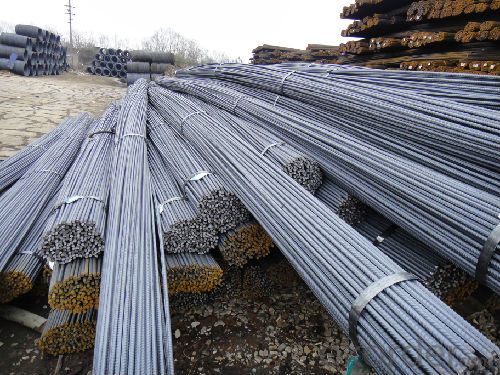
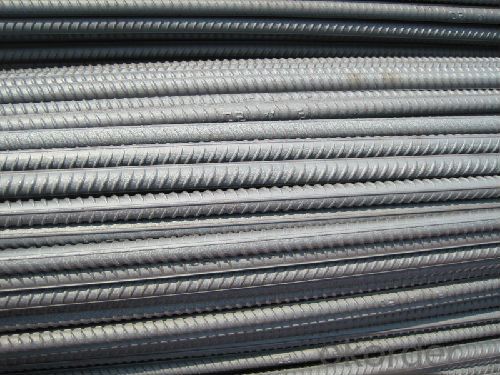
*If you would like to get our price, please inform us the size, standard/material and quantity. Thank you very much for your attention.
- Q:What is the average lifespan of a reinforced concrete structure with steel rebars?
- The average lifespan of a reinforced concrete structure with steel rebars can vary depending on various factors such as the quality of construction, maintenance, exposure to environmental conditions, and usage patterns. However, with proper design, construction, and maintenance, reinforced concrete structures with steel rebars can have an average lifespan of 50 to 100 years or more. Reinforced concrete structures are known for their durability and strength due to the combination of concrete and steel reinforcement. The concrete provides compressive strength, while the steel rebars provide tensile strength, making the structure resistant to various loads and forces. However, over time, reinforced concrete structures may experience degradation due to factors such as exposure to moisture, chemicals, temperature changes, and loading conditions. These factors can lead to the corrosion of steel rebars, which is a common concern for the longevity of such structures. Corrosion occurs when moisture and oxygen penetrate the concrete, causing the steel rebars to rust. This rusting process can lead to the expansion of the steel rebars, causing cracks in the concrete and further accelerating the deterioration of the structure. To mitigate the effects of corrosion and extend the lifespan of reinforced concrete structures, various measures can be taken. These include using high-quality concrete and steel rebars, applying protective coatings, implementing proper drainage systems, and conducting regular inspections and maintenance. With appropriate maintenance and upkeep, reinforced concrete structures can last well beyond their average lifespan. However, it is crucial to note that the lifespan can vary depending on specific conditions and circumstances. Therefore, it is essential to consult with structural engineers and industry professionals to assess and determine the expected lifespan of a particular reinforced concrete structure.
- Q:Can steel rebars be bent or shaped during construction?
- During construction, it is possible to bend or shape steel rebars. These rebars are commonly utilized in reinforced concrete structures to enhance their strength and stability. Although they are typically produced in straight lengths, they can be easily customized to fit the specific design requirements of the construction project. This adaptability allows contractors to reinforce different areas of the structure, including columns, beams, or slabs, by modifying the rebars. Specialized equipment, such as rebar benders or hydraulic tools, is usually employed in the process of bending or shaping the rebars. By doing so, construction professionals can guarantee that the reinforced concrete structure satisfies the necessary load-bearing and structural integrity standards.
- Q:Can steel rebars be used in school construction?
- Yes, steel rebars can be used in school construction. Steel rebars are commonly used in the construction industry as reinforcement for concrete structures, including schools. They provide strength and durability to the building, ensuring its long-term stability and resistance to various forces, such as earthquakes or heavy loads.
- Q:How do steel rebars affect the overall maintenance requirements of a structure?
- Steel rebars can greatly impact the overall maintenance requirements of a structure by enhancing its durability and longevity. The use of steel rebars in reinforced concrete structures increases their strength and resistance to structural failures such as cracks or collapses. This, in turn, reduces the need for frequent repairs and maintenance, ultimately extending the lifespan of the structure. Additionally, steel rebars provide increased resistance to corrosion, limiting the damage caused by environmental factors. Overall, the incorporation of steel rebars in construction helps minimize maintenance needs, ensuring a safer and more sustainable structure in the long run.
- Q:How are steel rebars protected against mechanical damage during construction?
- Steel rebars are protected against mechanical damage during construction through a process called bar caging. This involves enclosing the rebars in a wire mesh or steel cage, which acts as a protective barrier and prevents them from being easily damaged or displaced during the construction process. Additionally, rebars can also be covered with plastic sleeves or caps to provide an extra layer of protection.
- Q:What are the common problems associated with steel rebars in concrete structures?
- Some common problems associated with steel rebars in concrete structures include corrosion, inadequate cover, improper placement, and insufficient anchorage. Corrosion can weaken the rebars and lead to structural deterioration. Inadequate cover refers to the insufficient distance between the rebar and the surface of the concrete, which can increase the risk of corrosion. Improper placement can result in poor load distribution and compromised structural integrity. Insufficient anchorage occurs when the rebars are not properly embedded in the concrete, reducing their ability to resist tension forces.
- Q:Are steel rebars susceptible to magnetic fields?
- Yes, steel rebars are susceptible to magnetic fields. Steel is a ferromagnetic material, which means it can be magnetized and is attracted to magnets. This property is due to the presence of iron in the steel composition. When exposed to a magnetic field, the atoms in the steel align themselves with the field, causing the steel to become magnetized. However, it's important to note that the strength of the magnetic field required to magnetize steel rebars is generally quite high and requires a powerful magnet. In most everyday situations, the magnetic fields encountered are not strong enough to significantly affect the behavior or properties of steel rebars.
- Q:What are the different types of steel rebars used in underground structures?
- There exists a variety of steel rebars that are frequently utilized in underground structures, each possessing its own unique properties and characteristics. The decision regarding which type of rebar to use depends on a multitude of factors, such as the project's specific requirements, the necessary load-bearing capacity, and the environmental conditions of the underground structure. To begin with, there are mild steel rebars, which are also referred to as carbon steel rebars. These are the most commonly employed type due to their affordability and widespread availability. Mild steel rebars possess a low carbon content and offer commendable tensile strength, rendering them suitable for general construction purposes in underground structures. Next, we have high strength deformed (HSD) rebars, which are crafted from carbon steel and undergo additional heat treatment processes. These processes result in heightened yield strength and improved resistance to corrosion. HSD rebars find common usage in areas with high seismic activity or in situations where an increased load-bearing capacity is required. Furthermore, there are epoxy-coated rebars, which are specifically designed to combat aggressive environments that underground structures can be exposed to, including moisture and chemicals. By applying an epoxy coating to the surface of the rebar, enhanced corrosion resistance is achieved. This coating acts as a protective barrier, reducing the risk of corrosion and prolonging the lifespan of the rebar. Stainless steel rebars also play a significant role in underground structures. They possess an exceptional resistance to corrosion, which makes them ideal for usage in harsh underground environments. They prove particularly beneficial in structures where chloride or other corrosive agents are present, such as underground water treatment facilities or sewer systems. Lastly, there are galvanized rebars, which are coated with a layer of zinc to provide corrosion protection. This type of rebar is commonly employed in underground structures where moisture or exposure to corrosive elements is a concern. The zinc coating acts as a sacrificial layer, corroding in place of the rebar and extending its service life. In conclusion, underground structures employ various types of steel rebars, including mild steel rebars, high strength deformed rebars, epoxy-coated rebars, stainless steel rebars, and galvanized rebars. The selection of the appropriate rebar type is contingent upon the specific requirements and environmental conditions of the underground structure.
- Q:How do steel rebars affect the overall construction cost of industrial buildings?
- Steel rebars can significantly affect the overall construction cost of industrial buildings due to their crucial role in enhancing structural strength and durability. While the initial cost of steel rebars might be higher compared to other materials, their use can reduce the need for additional structural support, leading to potential cost savings in terms of labor, time, and materials. Moreover, steel rebars offer long-term benefits by minimizing maintenance and repair expenses, ultimately contributing to the overall cost-effectiveness of the construction project.
- Q:Can steel rebars be bent without breaking?
- Yes, steel rebars can be bent without breaking. Steel rebars are made from a strong and durable material called steel, which has excellent flexibility and tensile strength. This means that steel rebars can withstand significant bending forces without breaking or fracturing. However, it is important to note that there are limits to how much a steel rebar can be bent without causing damage. If excessive force is applied or if the rebar is bent beyond its maximum bending capacity, it may eventually break. Therefore, it is crucial to follow industry guidelines and specifications when bending steel rebars to ensure their integrity and structural performance.
1. Manufacturer Overview |
|
|---|---|
| Location | |
| Year Established | |
| Annual Output Value | |
| Main Markets | |
| Company Certifications | |
2. Manufacturer Certificates |
|
|---|---|
| a) Certification Name | |
| Range | |
| Reference | |
| Validity Period | |
3. Manufacturer Capability |
|
|---|---|
| a)Trade Capacity | |
| Nearest Port | |
| Export Percentage | |
| No.of Employees in Trade Department | |
| Language Spoken: | |
| b)Factory Information | |
| Factory Size: | |
| No. of Production Lines | |
| Contract Manufacturing | |
| Product Price Range | |
Send your message to us
High Quality Steel Deformed Bar HRB400 12/14/16mm
- Loading Port:
- Tianjin
- Payment Terms:
- TT or LC
- Min Order Qty:
- 50 m.t
- Supply Capability:
- 10000 m.t/month
OKorder Service Pledge
OKorder Financial Service
Similar products
New products
Hot products
Related keywords
